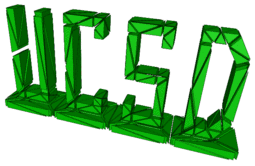| CCoM Research Training Group | |
| Interdisciplinary Research Training Group in | |
| Applied Mathematics, Computational Science, and Mathematical Physics | |
| Sponsored by NSF | |
|
CCoM Research Training Group Overview
In July 2014, NSF announced that a collaborative team of mathematicians at the Center for Computational Mathematics (CCoM) at UCSD had received a 5-year $1.8M NSF Research Training Group (RTG) Award. The Award supports an Interdisicplinary Research Training Group in Applied Mathematics, Computational Science, and Mathematical Physics, and will fund up to five UCSD Mathematics doctoral students participating in the CSME Doctoral Program, as well as provide funding for up to two named CCoM Postoctoral Fellowships, each year of the award. This is main website for the RTG Project, which is a collaboration between five faculty members in the UCSD Mathematics Department:
Research Training Group Summary The project centers on the organization and support of a coordinated training program for postdoctoral researchers, graduate students and undergraduate students that gives equal emphasis to theory, computation and application—the three cornerstones of modern research in applied mathematics. A fundamental goal of the project is to provide the students and postdoctoral researchers with the intellectual and software tools that they need to engage in cutting-edge research in either a university or industry based environment. The 5-year program is designed to fund up to 6 postdoctoral researchers, 10 graduate students, and 3 undergraduate students during the academic year and summer session. These postdocs and students will be organized into team-based research groups, with each team being coordinated and mentored by two or more of the Investigators. The Investigators are Faculty in the UCSD Mathematics Department, and are also core members of the UCSD Center for Computational Mathematics (CCoM). The research topic of each assembled team will reflect the diverse range of areas in applied mathematics, computational and data science, and mathematical physics that are focus areas of the Investigators. The cross-disciplinary aspects of the training program will be enhanced substantially by the newly developed interdisciplinary Computational Science, Mathematics, and Engineering (CSME) Doctoral Program at UCSD. The CSME Doctoral Program, the Center for Computational Mathematics, and the interdisciplinary CSME and CCoM Seminars, together form a unique, highly dynamic, interdisciplinary core research training environment for the personnel involved in the program. An outreach program includes elements devoted to the training of local-area high-school teachers on the important role of computational and applied mathematics in our society. Efforts will focus on local-area high schools that provide intensive college preparatory education for low-income students. The five Investigators participate in research programs covering a broad and diverse range of topics in applied mathematics, computational and data science, and mathematical physics. The research teams will be assembled around these focus projects: (i) new algorithms for parallel computation with adaptive multilevel finite elements; (ii) optimization with ordinary or partial differential equation constraints; (iii) structure-preserving numerical methods for field theories and interconnected systems; (vi) geometric numerical methods for applications in mathematical physics; and (v) numerical methods for quantum computation. Each focus project involves one of the Investigators as the lead, together with overlapping subsets of the remaining Investigators with the appropriate synergistic background. Students and postdoctoral researchers associated with each project will then be trained in a vertically and horizontally integrated research environment involving not only the Investigators within the Mathematics Department, but also leading scientists from physics, chemistry, biology, and engineering units at UCSD through interaction with these faculty in the research projects and through their training in the CSME Doctoral Program. The technology produced by this project will include mathematical algorithms, analyses, and numerical software that will provide powerful tools for the exploration of multiscale models in physics, chemistry, biology, engineering and medicine. The results will potentially impact the formulation, analysis and development of methods for critical complex multiscale and multiphysics problems that have a fundamental impact on the US economy. Project-sponsored students and postdocs will participate in the application of mathematical sciences to a range of research projects involving such diverse areas as undersea oil exploration, optimal power scheduling, drug design and organ modeling. Our outreach program to local-area high-schools will encourage students in under-represented groups to choose careers in applied mathematics and computational science. At the national level, the project will make a positive contribution towards achieving the long range goal of the program of expanding the work force of well-prepared US citizens, nationals and permanent residents in the mathematical sciences. In addition, the project will make an important contribution in the direction of the national priority of nurturing the crucial role of the basic mathematical sciences in interdisciplinary research. |



